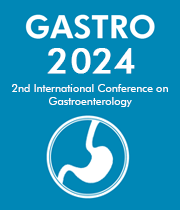Title : The inhibitor of interleukin-3 protects against neutrophil infiltration in severe acute pancreatitis
Abstract:
Background and purpose:
Severe acute pancreatitis (AP) is linked with leukocyte infiltration and tissue necrosis, but the cellular signaling pathways driving organ destruction in the pancreas remain unknown. IL-3 is a powerful regulator of different cellular processes that promote pro-inflammatory activities. In this study, we investigated the role of IL-3 signaling inacute pancreatitis.
Methods:
In C57BL/6 mice, pancreatitis was triggered by taurocholate infusion into the pancreatic duct. Prior to development of pancreatitis, animals were given an IL-3 inhibitor (100 mg/kg).
Results:
The administration of IL-3 significantly reduced the rise in L-arginine in serum amylase, pancreatic neutrophil infiltration, pancreatic edema formation, an acinar cell necrosis. Furthermore, in response to taurocholate challenge, inhibition of farnesyltransferase decreased the MPO levels in the pancreas and lung. However, IL-3 therapy had a significant impact on Larginine, provoked macrophage inflammatory protein-2 (MIP-2) induction in the pancreas. Interestingly, IL-3 inhibition eliminated Mac-1 expression on neutrophils in pancreatitis-affected mice. Additionally, in vitro isolation of neutrophils revealed that IL-3 significantly reduced MIP-2- induced Mac-1 upregulation, pointing to a direct function for IL-3 in regulating Mac-1 expression in neutrophils. Finally, secretagogue-induced activation of trypsinogen in pancreatic acinar cells in vitro, wasnot directly affected by the inhibition of IL-3.
Conclusions:
These results show that IL-3 signaling plays a significant role in acutepancreatitis by regulating tissue injury and neutrophil infiltration via expression of Mac-1 on neutrophils Thus, in addition to clarifying pancreatitis signaling processes, our findings also raise the possibility that IL-3 can represent a new target in the treatment of severe AP.



